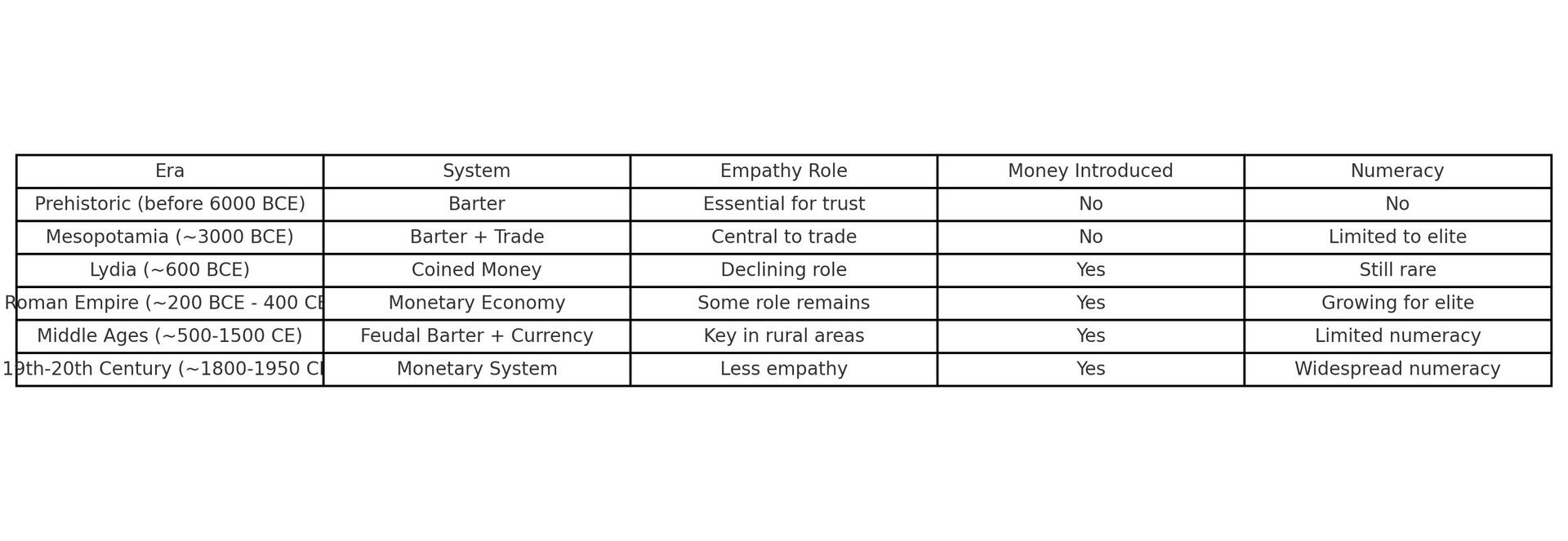Introduction
Before the invention of money and numeracy, humans engaged in barter, a system driven by empathy, trust, and mutual understanding. This post explores how human empathy was the foundation of exchange in the absence of standardised currency and numeracy. Parity between the use of money and numeracy wasn’t achieved until the 20th century, significantly altering human interaction.

Barter Systems and Empathy
Long before coins were minted in Lydia (~600 BCE), humans traded directly, exchanging goods such as grain, livestock, and tools. In these transactions, empathy was critical. Without numeracy, people had to negotiate with an understanding of each other’s needs, making empathy the true “currency” of these exchanges. Trust, rooted in personal relationships, was essential for successful barter.
The following is in order of the Era, the System, Empathys Role, was Money Introduced and what was the Numeracy Level at that time.
Prehistoric (before 6000 BCE) Barter Essential for trust No No
Mesopotamia (~3000 BCE) Barter + Trade Central to trade No Limited to elite
Lydia (~600 BCE) Coined Money Declining role Yes Still rare
Roman Empire (~200 BCE - 400 CE) Monetary Economy Some role remains Yes Growing for elite
Middle Ages (~500-1500 CE) Feudal Barter + Currency Key in rural areas Yes Limited numeracy
19th-20th Century (~1800-1950 CE) Monetary System Less empathy Yes Widespread numeracy
The Role of Empathy in Trade
Barter systems required empathy as traders had no numerical metrics or money to guide exchanges. Trust between individuals was critical for negotiating value. Human empathy ensured fair exchanges, strengthened communities, and was the basis of survival.
Impact of Money and Numeracy
When money emerged, starting with Lydia, it reduced the direct role of empathy in exchanges by standardising value. Over time, the spread of numeracy—basic arithmetic skills that became common between 1900-1950—transformed how individuals engaged in trade. Parity was finally reached when people could both use money and understand its abstract value.
Conclusion
Before money and numeracy became widespread, barter was based on empathy. As modern economies developed, the personal and empathetic aspects of exchange diminished. Understanding this reminds us that economic systems once required deeper human connection—an essential part of early trade that deserves reflection in today’s complex world.
Sources:
Glyn Davies, A History of Money
David Graeber, Debt: The First 5,000 Years
Niall Ferguson, The Ascent of Money
Joel Kaye, A History of Balance, 1250-1375
Importantly, Empathy could not be transferred in to Money as humans did not have the level of numeracy to allow that to happen and Money was not strong enough to accept that Empathy in any event.
